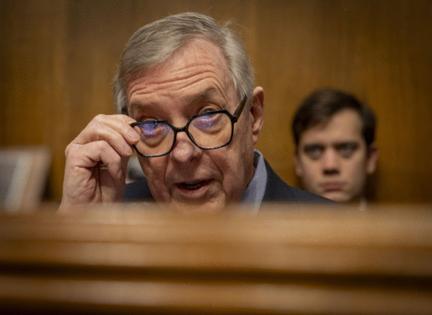H-1B visa: Trump administration changes spark bipartisan attack on Silicon Valley tech giants
Published in Political News
As the Trump administration seeks sweeping changes to the controversial H-1B visa for skilled foreign workers, bipartisan scrutiny is falling on Bay Area tech giants Meta, Apple and Google, which are among the companies that use it the most.
“In evaluating the high unemployment rate for American tech workers, we cannot ignore the massive, ongoing layoffs ordered by you and your peers,” a letter Wednesday to the three companies and seven other firms from Democratic U.S. Sen. Dick Durbin of Illinois and Republican Sen. Chuck Grassley of Iowa said.
The administration of President Donald Trump last week announced the federal government will start imposing a $100,000 fee on new H-1B visas on top of existing fees of about $5,000. This week, the administration introduced a proposal to change the lottery-based allocation system for the visa to give applications for jobs at higher wage levels a better chance of success.
The senators’ letter cites federal data that shows Meta as the fourth-largest U.S. user of H-1B visas with 5,123 new and continuing approvals this year, Apple the fifth-biggest with 4,202 approvals, and Google the sixth-largest with 4,181.
Meta and Apple both received more approvals this year than last year, and Google received about 1,200 fewer.
The senators pointed to substantial layoffs in Silicon Valley in recent years, saying Apple’s four rounds of job cuts last year ousted hundreds of workers, and that Google “laid off tens of thousands of employees in recent years,” while Meta “laid off a quarter of its workforce between 2022 and 2023,” plus 3,600 this year, “overshooting its stated goal of laying off another five percent of its workforce.”
“With all of the homegrown American talent relegated to the sidelines, we find it hard to believe that you cannot find qualified American tech workers to fill these positions,” the senators wrote.
Google, whose parent company Alphabet made $100 billion in profit last year according to regulatory filings, Apple, which made $94 billion, and Meta, which made $62 billion, did not immediately respond to questions about the senators’ letter or how they plan to respond to the H-1B fee and proposed lottery change.
Both the fee and lottery change are expected by legal experts to generate numerous lawsuits.
Rufus Jeffris, spokesman for the Bay Area Council, which represents businesses including major tech firms, called the new fee “very troubling” and said it would produce “a serious shock to our economy and the companies that rely on these workers, and could have serious consequences for our ability to grow and compete.”
The H-1B visa, long a flash point in America’s immigration debate, pits major tech companies, along with their investors and the staffing firms supplying foreign workers to them, against critics who point to the alleged replacement of U.S. workers and the undercutting of wages. Earlier this year, the controversy exploded into vitriolic political battles after a conservative influencer attacked the employment of Indian tech workers in the U.S., and Trump’s Make America Great Again movement fractured, setting anti-immigrant factions against influential tech-industry figures in the administration. Among Democrats, Big Tech donors have faced off against organized labor over the visa.
Some 600,000 foreign workers in the U.S. hold the visa, including large numbers in the Bay Area. Each year, 85,000 new H-1B visas are issued by lottery.
Stuart Anderson, executive director of the H-1B-supporting National Foundation for American Policy, sees the new $100,000 visa fee and proposed lottery change as part of Trump administration efforts to restrict immigration.
“What they’re trying to do is really break the immigrant-talent pipeline,” Anderson said Friday. “The policies are going to be very harmful.”
Anderson’s group estimates the lottery change would cut the number of applications for the lowest two of the four wage levels — especially at the bottom level — while boosting the top two. That would slash the flow into American businesses of foreign citizens recently graduated from U.S. schools, and early career professionals from other countries, who generally provide valuable contributions to innovation and companies’ growth as their careers progress, Anderson said. The change also would harm U.S. universities by deterring foreign students from attending because their chances of working in America after graduation would plunge, Anderson added.
A 2022 study by Anderson’s group found 55% of U.S. startups valued at $1 billion or more have at least one immigrant founder, and Anderson believes the burden of a $100,000 fee would hamper the creation and growth of new startups.
While some critics of the fee have suggested it would give advantages to deep-pocketed Big Tech companies, Anderson believes the levy and the proposed H-1B rule change will push major players to employ talented foreign workers at overseas offices, where they would contribute relatively little to the U.S. economy.
“The U.S. government is basically sending a signal to companies that you’re better off hiring a person abroad and you can avoid all this nonsense,” Anderson said.
Howard University professor Ron Hira, whose H-1B research is cited in the federal government proposal to change the lottery rules, believes the change and new fee are “good news for the American economy, for American workers, and for the new H-1B workers that are going to be treated more fairly, that are going to be paid fairly.”
Newly released federal data show 83% of H-1B visas issued from 2020 to 2024 were for the two lowest wage levels, which fall below average pay, which is represented by Level 3. At Level 1 — purportedly for entry-level workers — 17,000 visas were issued for people with master’s degrees, Hira said.
Companies are using the visa “to fill very ordinary positions,” Hira said. “They’re not using it for the best and the brightest. That begs the question of why American workers can’t fill the spots.”
_____
©2025 MediaNews Group, Inc. Visit at mercurynews.com. Distributed by Tribune Content Agency, LLC.
























































Comments